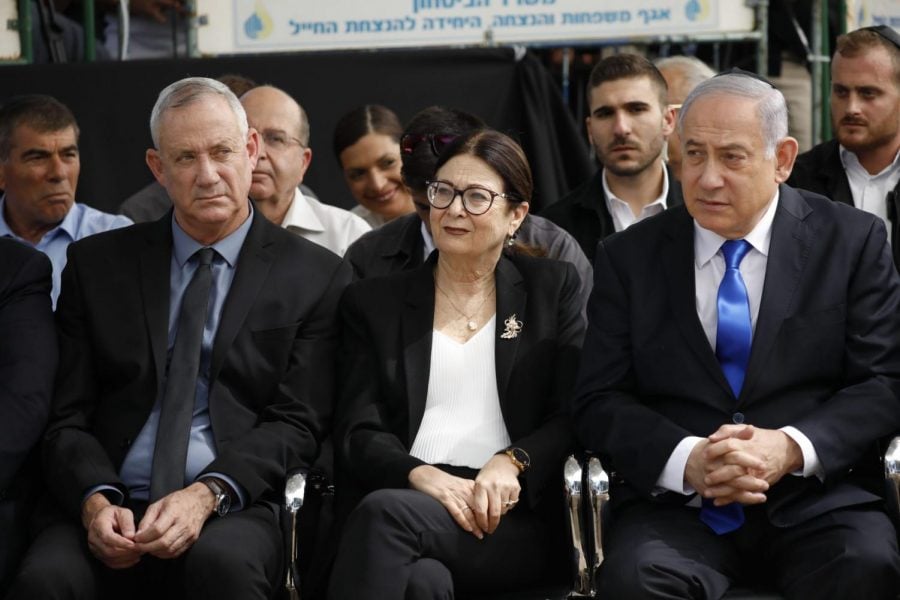Israel’s political future uncertain amid election deadlock
Blue and White party leader Benny Gantz, left, Esther Hayut, the Chief Justice of the Supreme Court of Israel, and Prime Minister Benjamin Netanyahu attend a memorial service for former President Shimon Peres in Jerusalem on Sept. 19, 2019.
Israel’s second round of elections in six months appeared Sunday to leave the country’s political future in doubt, even as Israeli President Reuven Rivlin began talks with representatives of the elected parties to make his recommendation for prime minister.
Under Israel’s parliamentary system, Rivlin must recommend the person whom he believes has the best chance of forming a majority coalition government, which does not necessarily have to be the leader whose party has the most seats in parliament. If the eventual prime minister can’t form a coalition, Israelis could end up back at the polls for a third time this year.
In the wake of Tuesday’s elections, which were largely seen as a referendum on Netanyahu himself, the centrist Blue and White party won 33 seats to right-wing Likud’s 31 in Israel’s 120-seat Knesset, or parliament. Neither of the deadlocked parties secured an outright majority of 61 seats with their coalition partners, leading to the current series of negotiations.
The elections are Israel’s second in six months, called by Netanyahu after he failed to form a coalition government in April. The campaign saw Netanyahu, head of the right-wing Likud party, make a series of fiery announcements including a planned annexation of the Jordan Valley — part of the occupied West Bank and home to roughly 65,000 Palestinians and 11,000 Israeli settlers — and the installation of cameras at Israeli ballot boxes to clamp down on what he claimed was voter fraud committed in towns with large Arab populations. (Israel’s parliament blocked the measure earlier this month.)
His main rival, former Israeli Defense Forces chief Benny Gantz of the centrist Blue and White Party, sought to paint himself as a calmer, more moderate figure in the face of Netanyahu’s strident rhetoric and pending corruption charges from Israel’s attorney general, who, on the recommendation of the Israel Police, recommended Netanyahu be indicted on charges of bribery, fraud and breach of trust in February.
Ilana Shpaizman, an assistant professor in the Department of Political Studies at Bar-Ilhan University, said experts were expecting a low turnout, but almost 70 percent of the electorate turned out to the polls, more than in April. She also said the increased turnout among eligible Arab voters, who comprise about 20 percent of Israel’s population, was driven by Netanyahu’s rhetoric and helped the Arab Joint List party to become the third-largest party in parliament with 13 seats.
“This signal is one of the most important outcomes of this elections and may lead to a significant change as can be already seen in the fact that, for the first time in many years, the leaders of the Joint List parties decided that they will recommend that Beni Gantz will be the prime minister,” she said in an email. “Until today, they did not express their support for any candidate.”
Arab-led parties have never sat in parliament, and it is unlikely they would become the country’s main opposition party because Likud and other parties typically refuse to work with them.
Shpaizman pointed to the majority of the Israeli public being more secular as a contributor to Blue and White’s success.
“While Netanyahu mostly emphasized himself in the campaign, Gantz emphasized state and religious issues as well as being moderate,” she said.
Avigdor Lieberman, former Israeli defense minister, is part of this secularist push. He has shunned ultra-Orthodox parties whom Netanyahu counts as allies. His Yisrael Beitenu party secured eight seats, leading many analysts to call him a “kingmaker” who is uniquely positioned to lend support to either Netanyahu or Gantz in a unity government.
He reiterated his call for a unity government Sunday, rejecting rumors that he prefers Gantz to incumbent Netanyahu. The latter offered Thursday to meet with Gantz and discuss such a proposal, but the Blue and White Party leader rejected the offer.
The question of who would be prime minister remains.
“I believe a unity government will be likely if Netanyahu will step down,” Shpaizman said. “This is possible if the attorney general will submit an indictment in the next couple of weeks.”
As for Lieberman, Shpaizman said that he is not an idealist and “given his track record, he is usually not true to his word and can flip at any moment.”
“Thus, it is also possible that he will eventually support Netanyahu or alternatively will support no one. He is highly unpredictable … especially today when he has a lot of power,” she said.







